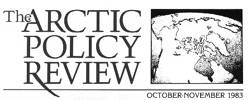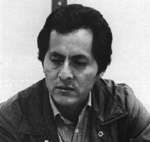
World Council of Indigenous Peoples:
WCIP President Addresses ICC

Jose Carlos Morales
The opening of the ICC meeting in Frobisher Bay was marked by an address by Jose Carlos Morales, president since 1981 of the World Council of Indigenous Peoples (WCIP), an organization concerned with the plight of Native peoples around the globe. Morales told the delegates that Indians in Central America are being killed by military regimes supported by the United States, and that Native peoples must unite to combat the forces that aim to destroy them.
Originally of the Brunka tribe of Costa Rica, where he is an agricultural engineer, Morales was on a trip taking him from western Canada to Lapland, through the Arctic, Iceland, Switzerland, and Germany.
In a later interview with Francois Bellemare, writing for LeDevoir in Montreal, Morales said he was seeking an ICC resolution supporting the people in South and Central America and condemning the U.S. involvement in those countries. “We really live in a very dangerous situation in Central America,” he said. Each say we have killings of the Indian people in Guatemala, about 200 people a day die there.
He said a major problem with the violence in Central America is that hundreds of thousands of Natives have escaped to Mexico and live there illegally, usually under poor and unhealthy conditions. About one million Guatemalans live in constant fear of being caught by the military whom they are actively fighting and must move from one place to another constantly. “We need all the people in the world to fight oppression, to pressure the Mexican government to give refugee status to Central Americans and to force the U.S. to get out of Central America.”
The WCIP represents the Natives in five different regions of the world, the South Pacific (with Australia and New Zealand), the Pacific (Polynesian islands), the Regional Conference of Indian Peoples (Mexico, Central America, Panama), the Indian Council of South America (from Colombia to Argentina), and the Northern Council of Saami Peoples (of northern Scandinavia). Morales stated that the group also works a lot with two large organizations, the National Congress of American Indians and the Assembly of First Nations of Canada, and hopes to establish more formal relations with the ICC.
“We have a non-governmental organization status with the Economic and Social Council (UNESCO). We don’t receive any direct aid from our governments, whose interests are often contrary to ours, especially in the case of Latin America. Now, what we promote first of all is the formation of grassroots organizations in local communities, after which they join on a regional, then a national basis. Finally, those national organizations join the Council through one of our five regions,” Morales stated.
The basic goals of the organization are mainly to promote the unity of Native peoples throughout the world. For that, he explained, the exchange of information between the peoples — and other sectors of society — is indispensable. “We support, financially and otherwise, different social development projects. but our role is basically political: to unify native forces of the world,” he stated.
“The needs of our peoples are much larger than the capacities of our organizations to meet them. Nevertheless, the movement is getting stronger day by day, by reason of the philosophical principles which are the reason for our existence, one of which is the right to the common earth. This principle, found among all Native peoples, was interrupted by western culture. But it would be possible for us to re-appropriate this system of rational use of the earth, of the environment. By the way, it is also an alternative for the survival of Humanity itself. Contrary to both western and eastern systems which consider the earth as merchandise, we promote the right of common use which is the only way to protect human values, natural resources, and the prolongation of Humanity’s life itself.”